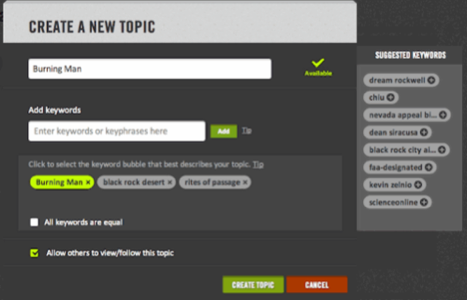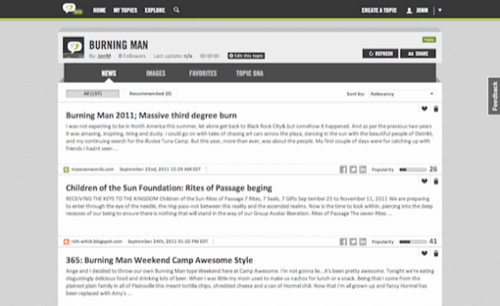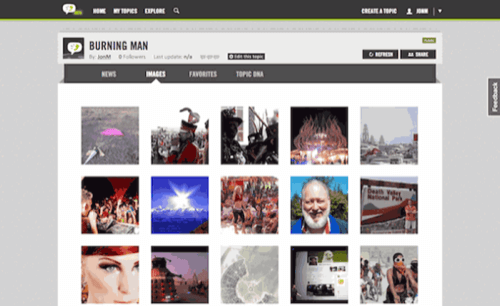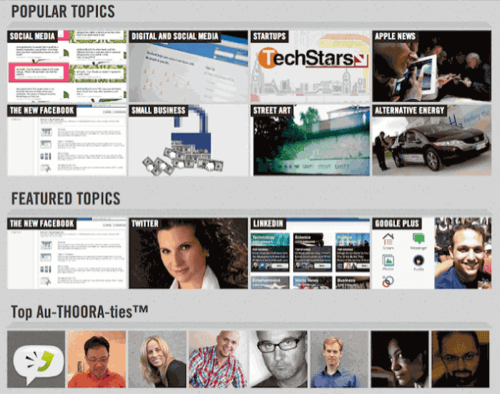With a Web full of stuff, discovery is a hard problem. Search engines were the first tools on the scene, but their rankings still have a hard time identifying relevance the same way a human user would. These days, social networks are the substitute for content discovery, and even the major search engines are using your social signals to determine what’s relevant for you. But the obvious problem with social search is that if your friends haven’t discovered it yet, it’s not on your radar.

At some point, someone in the social graph has to discover something for the first time. With so much new content getting churned out all the time, a Web surfer looking for something original could use some algorithmic help. A new app called Thoora, which launched its public beta last week, uses the power of machine learning to help users uncover new content on topics that interest them.

Digging For Content
Thoora was founded in 2008, and it originally launched as a real-time news aggregator, which we covered back in 2009. But this new iteration is about much more than scanning the news. This is a toolkit for users to explore and research topics, and it learns more about them as its users sort out what matters to them. It is a social tool – users can share topics, and the Thoora site features highlights – but the purpose of the tool is to turn up the most relevant content on the topic, no matter how deeply it’s buried in the Web.
“We like to say that we’re at the intersection of aggregation, curation and search,” says Carrie Shaw, head of product at Thoora. As far as users are concerned, that’s a good description, but the real value of Thoora comes from the learning algorithms at work behind the scenes. As users create topics, discover content and clean up the results, the Thoora engine gets better at recommendations.
Shaw says the algorithm scours “28 million sources from the traditional media and the blogosphere… looking at over 100 signals to figure out the relevancy of the results and the order in which to present them.” These include social signals, such as shares on Twitter, but it also looks for comments on the article itself, as well as other signs of article quality. If an article is swarming with ads or can be identified as the product of a content farm, that article’s importance is diminished.
Creating A Topic
Currently, topics on Thoora stand alone, and topics with the same name by different users are not related. But Shaw says there are some advantages to that, because “different topics develop different angles over time,” since topics can have different focuses and keywords. Users can browse existing topics through the Explore gallery, but the best way to see Thoora in action is to create a topic from scratch.

As soon as you choose a title, you can already see the engine at work. A suggested list of keywords appears on the right side, and the keywords adjust as you add more. Before creating the topic, you can either select one keyword as the main descriptor, or you can check “All keywords are equal.” Finally, decide whether you want other members to be able to view and follow the topic (on by default), and then click “create topic.”

After creating a topic, you can even pull in specific Twitter accounts or RSS feeds to put Thoora’s engine to work on links that arrive there. It’s a cool way to augment the firehose of content that the algorithm filters through. These can be seen in a tab called “Topic DNA,” which shows all the user inputs going into the topic, including its followers, ratings, keywords and more.
The topic page displays a list of text articles with a range of sorting options. The article tab lists the title and a short excerpt along with the source, the date of publication, and the Thoora engine’s popularity rating for it. Another tab surfaces related images.

Popularity is hardly the most important factor to the algorithm. In fact, it does a good job of identifying content on minor blogs due to other quality signals, whereas Google News would overlook a site without an established reputation.
If the topic you’ve created turns up weird or irrelevant results, that’s an opportunity, not a problem. There’s a trash can button to indicate to Thoora that a result isn’t relevant, and if you delete it, the topic updates right away. You can also click the heart button to indicate to Thoora any articles you particularly liked. These new data points improve the algorithm for all users over time.
Sharing The Experience
Though Thoora is useful for personal research, it’s also a shareable experience. Users can follow one another and see when new topics are posted. Topics and articles can be easily shared, and Thoora’s Explore tab features popular topics, featured topics selected by Thoora editors, and a list of “Au-THOORA-ties” who have lots of followers and create good topics.

The Business of Discovery
Thoora is free, and Shaw says it will implement premium level of service in the coming months. The premium service will target content marketers, and Shaw says it will be “a very low cost.” The main additional features will be analytics tools and integration with outside analytics software.
Whether you’re a blogger or journalist, an academic, or you’re just interested in something, a machine learning-powered tool like Thoora could be a powerful alternative to a purely social service.
If you give Thoora a try, share your cool topics with us in the comments.










